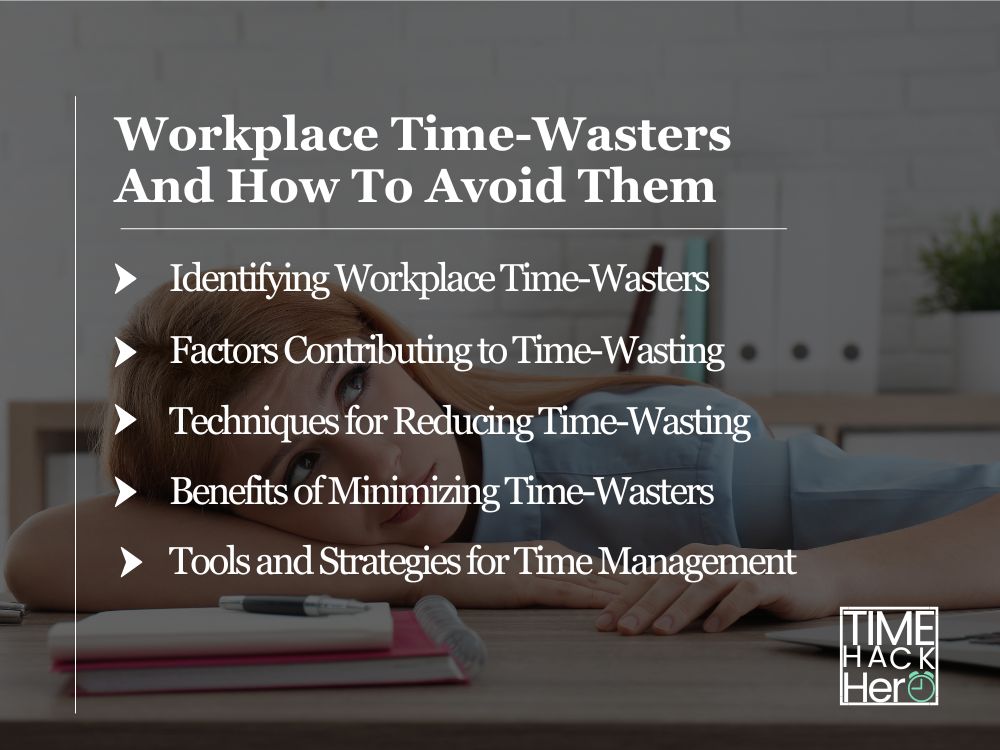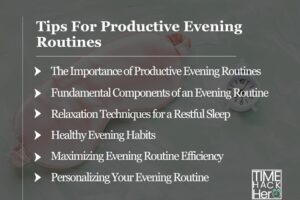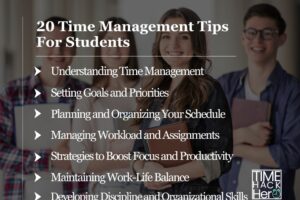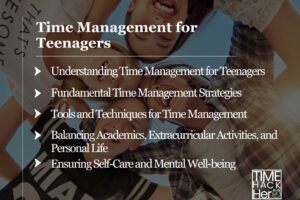In today’s fast-paced work environment, it’s crucial for professionals to manage their time efficiently and effectively. Despite our best intentions, however, we often encounter obstacles that prevent us from achieving maximum productivity. One of the major culprits is workplace time-wasters: activities or habits that eat away at valuable time and prevent us from accomplishing important tasks.
In order to create a more productive and focused work environment, it’s essential to identify these time-wasting habits and implement strategies to avoid them. Byrecognizing and overcoming these productivity roadblocks, professionals can work more efficiently, improve their overall job performance, and better meet expectations in their roles.
This article will discuss several common time-wasters encountered in the workplace and offer practical solutions for avoiding them. With the right strategies in place, you can reclaim your time and prioritize what truly matters for your workday, leaving you empowered to accomplish your goals and drive your career forward.
Table of Contents
Identifying Workplace Time-Wasters
Unnecessary Meetings
Unnecessary meetings are a major time-waster in many workplaces. They often involve lengthy discussions with no clear agenda or outcome. To avoid this issue:
- Set clear objectives for each meeting
- Invite only relevant team members
- Keep meetings focused and time-limited
Excessive Emails
Excessive emails can lead to inefficiency and waste valuable time. Instead, it’s important to:
- Prioritize and only respond to essential emails
- Consider using instant messaging or collaboration tools for quick communication
- Set designated times during the day to focus on emails
Distracting Notifications
Distracting notifications from various apps, emails, and social media can reduce productivity. To manage these interruptions:
- Adjust notification settings to reduce distractions
- Schedule dedicated time for checking notifications
- Use tools like “Do Not Disturb” mode when working on important tasks
| Strategy | Benefit |
|---|---|
| Adjust notification settings | Minimize interruptions during work |
| Schedule dedicated time | Stay focused on tasks and reduce multitasking |
| Use Do Not Disturb mode | Improve concentration during critical work |
Online Distractions
Online distractions, such as social media and non-work-related websites, can significantly decrease productivity. Combat these distractions by:
- Setting time limits on personal browsing
- Utilizing browser extensions to block distracting websites
- Focusing on work tasks and setting personal browsing for breaks
Cluttered Work Environment
A cluttered work environment can lead to wasted time searching for documents or items. To optimize your workspace:
- Organize files and folders for easy access
- Declutter workstations regularly
- Utilize digital storage solutions for better organization
By being aware of these common workplace time-wasters and implementing strategies to avoid them, you can increase your efficiency and productivity.
Factors Contributing to Time-Wasting
Lack of Organization
Disorganization can lead to wasted time as employees spend unnecessary time searching for items or information. To combat this, maintain a clean work area, create a functional filing system, and prioritize tasks based on importance and urgency.
Poor Time Management
Inefficient time management makes it difficult for employees to prioritize tasks and allocate appropriate time to accomplish them. Utilize time-management techniques such as time blocking, setting SMART goals, and using productivity tools to stay on track.
Working Without a Plan
Working without a plan can lead to confusion and inefficiency. Create a daily or weekly schedule, set clear objectives, and break down tasks into smaller, manageable steps to stay focused and organized.
Insufficient Delegation and Micromanagement
Managers that fail to delegate tasks or micromanage employees can negatively impact productivity. Trust in employees’ abilities, delegate tasks effectively, and provide guidance when needed to prevent time-wasting.
Procrastination
Procrastination results in wasted time as employees put off tasks until the last minute. Overcome procrastination by setting deadlines, breaking tasks into smaller parts, and finding motivation through rewards or incentives.
Multitasking
Multitasking often leads to decreased focus and productivity. Prioritize tasks and focus on one task at a time to minimize distractions and improve overall performance.
Interruptions from Colleagues
Frequent interruptions from colleagues can disrupt the flow of work. Set boundaries, communicate “do not disturb” times, and schedule breaks or check-ins to help reduce interruptions and maximize productivity.
Stress and Burnout
Stress and burnout can significantly hinder productivity and contribute to time-wasting. Practice self-care, manage workload, and seek support when necessary to maintain a healthy balance and continue performing at an optimal level.
Techniques for Reducing Time-Wasting
Prioritizing Tasks
To minimize wasting time at work, start by prioritizing tasks effectively. Create a daily to-do list that includes critical tasks that must be completed within the day, and arrange them in order of importance. Consider using task prioritization techniques such as the Eisenhower Matrix or ABCDE method.
Improving Focus and Concentration
Increasing focus and concentration can significantly reduce time spent on distractions. Some methods to improve focus and concentration include:
- Setting specific goals for each task
- Blocking out distracting noises with noise-cancelling headphones or white noise
- Taking regular breaks to avoid mental fatigue
Managing Social Media and Notifications
Social media and notifications can consume a significant amount of time during the workday. To manage them, consider:
- Setting specific times to check social media and limiting usage to those designated periods
- Disabling non-essential notifications, or only enabling them from important contacts
- Using website blockers to restrict access to time-wasting sites
Effective Email Communication
Emails can be a time-consuming aspect of work. Some strategies for handling emails effectively include:
- Utilizing email filters to automatically categorize and label important emails
- Setting specific times to check and respond to emails
- Writing well-structured and concise emails to minimize back-and-forth communication
Limiting Meeting Duration and Frequency
Unnecessary meetings can be a significant time-waster. To limit meeting duration and frequency, try:
- Establishing a clear agenda and shared goals for each meeting
- Inviting only necessary participants
- Scheduling meetings only when absolutely necessary
- Implementing meeting timers and sticking to a predetermined time frame
Creating a Clean and Organized Workspace
A cluttered workspace can negatively impact productivity. Keeping your workspace clean and organized can help reduce time wasted searching for documents and items. Some tips include:
- Regularly decluttering and organizing your desk
- Labeling and filing important documents in an easily accessible system
- Grouping related items together, such as office supplies or project materials
Benefits of Minimizing Time-Wasters
Increased Productivity
Minimizing workplace time-wasters can lead to a significant increase in productivity. By eliminating distractions such as social media, excessive meetings, and disorganization, employees can focus on their tasks and complete projects more efficiently. This means more work is accomplished and goals are met in a timely manner.
Higher Quality of Work
When employees can dedicate their full attention to tasks, the quality of their work improves. Distractions and time-wasters often lead to rushed output, errors, and missed opportunities. A focused environment results in better decision-making, thorough analyses, and increased attention to detail, which translates into high-quality work.
Reduced Stress and Burnout
Eliminating time-wasters helps in reducing stress levels and preventing burnout. When employees are not overwhelmed with distracting tasks, they can manage their workload more effectively, leading to a healthier work-life balance. A balanced employee is less likely to experience burnout and maintains a positive attitude toward their job.
Improved Collaboration
Focused employees are more willing to engage in collaborative projects and can contribute effectively to team goals. By minimizing time-wasters, employees have more time and energy to communicate and collaborate with their colleagues. As a result, teamwork improves and projects are completed efficiently.
Financial Implications
Reducing time-wasters at work also has financial implications. Higher productivity and quality of work lead to reduced costs of doing business, as tasks are completed on time and resources are used efficiently. Additionally, happier, less-stressed employees tend to stay with a company longer, leading to reduced turnover and lower costs associated with hiring and training new staff.
By minimizing time-wasters in the workplace, it is clear that organizations can enjoy a range of benefits, including increased productivity, higher quality of work, reduced stress and burnout, improved collaboration, and positive financial implications.
Tools and Strategies for Time Management
Time Management Apps
Time management apps can help you stay organized and prioritize your tasks. Some popular apps include:
- Toggl: A simple time tracking app
- RescueTime: Helps you understand where your time is spent
- Wunderlist: A to-do list app
Using these tools, you can track your time, set goals, and constantly reinforce positive habits.
Goal Setting
Setting clear and achievable goals is essential to time management. Prioritize your tasks and break them into smaller, manageable steps. Create a timeline for completion and regularly review your progress. This helps maintain focus and motivation, ensuring you work more efficiently.
Effective Listening
In the workplace, effective listening can minimize misunderstandings and improve communication. To practice effective listening:
- Pay close attention to the speaker
- Avoid interrupting
- Reflect on what is being said
This skill prevents wasted time on miscommunications and can lead to better collaboration and productivity.
Delegating and Collaborative Work
Delegating tasks empowers team members and frees up time for other responsibilities. When delegating, consider your team’s strengths and skills, and communicate clearly your expectations. Additionally, promoting a collaborative work environment fosters creativity and problem-solving, allowing your team to complete tasks more efficiently.
By implementing these strategies, you can overcome common workplace time-wasters, effectively manage your time, and increase overall productivity.
Conclusion
In summary, workplace time-wasters can significantly impact productivity and overall job performance. By recognizing and addressing these common distractions, employees can improve efficiency and focus on their responsibilities more effectively.
To avoid these time-wasters, consider the following strategies:
- Limit social media activity during work hours by setting specific time blocks for checking personal accounts.
- Schedule dedicated times for checking and responding to emails, rather than continuously monitoring your inbox throughout the day.
- Evaluate the necessity of meetings and explore alternatives, like concise email updates or quick phone calls, when appropriate.
- Be mindful of smartphone usage during work hours and try to minimize distractions from personal devices.
- Prioritize tasks and set clear goals for each day, which can help maintain focus on important projects and objectives.
By implementing these strategies, employees can minimize wasted time and maintain a higher level of productivity throughout the workday. Additionally, employers can support these efforts by fostering a focused workplace culture and providing resources, like time-management training, to help their teams succeed.









